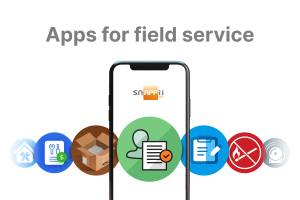In the competitive landscape of mobile app development, businesses and entrepreneurs are faced with a critical decision: whether to opt for ready-made, off-the-shelf apps or invest in custom development to build a solution tailored to their unique needs. Both approaches offer distinct advantages and considerations, and understanding the differences between them is essential for making an informed decision. In this blog post, we’ll explore the pros and cons of ready-made apps versus hiring a developer to build an app from scratch.

Ready-Made Apps:
1. Speed to Market:
Ready-made apps provide a quick and convenient solution for businesses looking to launch their app in a timely manner. With pre-built templates and functionality, businesses can significantly reduce development time and get their app to market faster. This can be particularly advantageous for businesses operating in fast-paced industries or those looking to capitalize on emerging trends.
2. Cost-Effectiveness:
Ready-made apps typically come with a fixed pricing model or subscription fee, making them a cost-effective option for businesses with limited budgets or resources. By eliminating the need for custom development, businesses can save on upfront costs and avoid the complexities associated with hiring developers and managing a development team.
3. Ease of Use:

Ready-made apps are designed with user-friendliness in mind, offering intuitive interfaces and features that are easy to navigate and understand. This can be beneficial for businesses looking to quickly deploy an app without extensive training or technical expertise. Ready-made solutions often come with built-in support and documentation, further simplifying the implementation process.
Custom Development:
1. Tailored to Specific Requirements:
Perhaps the most significant advantage of custom development is the ability to create an app that is precisely tailored to the unique requirements and objectives of the business. Custom-built apps offer unmatched flexibility and scalability, allowing businesses to incorporate custom features, branding elements, and integrations that align with their strategic goals and vision.
2. Greater Control and Ownership:
Custom development provides businesses with greater control and ownership over their app, from design and functionality to data management and security. Unlike ready-made apps, which may be subject to licensing agreements or third-party dependencies, custom-built apps offer full autonomy and control over every aspect of the development process.

3. Scalability and Future-Proofing:
Custom-built apps are inherently more scalable and adaptable to evolving business needs and technological advancements. Businesses can easily integrate new features, scale infrastructure, and accommodate growth without being constrained by the limitations of off-the-shelf solutions. This future-proofing capability ensures that the app remains relevant and competitive in the long run.
Considerations for Decision-Making:
– Budget and Resources: Consider your budget constraints and available resources when evaluating the cost-effectiveness of ready-made apps versus custom development.
– Time to Market: Assess the urgency of getting your app to market and weigh the trade-offs between speed and customization.
– Long-Term Strategy: Consider your long-term business objectives and whether a ready-made solution or custom-built app aligns better with your strategic vision and growth plans.
– Technical Requirements: Evaluate the complexity of your app’s functionality and features to determine whether a ready-made solution can adequately meet your needs or if custom development is necessary.
In conclusion, the choice between ready-made apps and custom development ultimately depends on the specific requirements, goals, and constraints of the business. While ready-made apps offer speed and cost-effectiveness, custom development provides unparalleled customization and control. By carefully weighing the pros and cons of each approach and aligning them with your business objectives, you can make an informed decision that sets your app up for success in the competitive mobile landscape.

 Login
Login




 Mobile construction apps are of a high priority
Mobile construction apps are of a high priority The source of much-needed agility
The source of much-needed agility A whole host of issues can follow low productivity and ultimately the business may stop developing and profits won’t be able to exceed costs. Therefore, businesses often face the question of how to increase employee productivity. Here are some tips that will be useful in this matter.
A whole host of issues can follow low productivity and ultimately the business may stop developing and profits won’t be able to exceed costs. Therefore, businesses often face the question of how to increase employee productivity. Here are some tips that will be useful in this matter. At construction jobsite, safety of workers is the top priority. Modern mobile solutions come to the rescue and help make construction sites safer and avoid accidents. Let’s consider how it works.
At construction jobsite, safety of workers is the top priority. Modern mobile solutions come to the rescue and help make construction sites safer and avoid accidents. Let’s consider how it works. Snappii’s Construction Daily Log mobile app is the quickest way to create professional daily reports in minutes. This #1 App is used by tens of thousands of construction companies around the world.
Snappii’s Construction Daily Log mobile app is the quickest way to create professional daily reports in minutes. This #1 App is used by tens of thousands of construction companies around the world.  Snappii Corporation, a market leader in Business Mobile app solutions today announces that it has over 68 thousand mobile business apps built on its mobile app development platform in different industries used by 1 million users worldwide.
Snappii Corporation, a market leader in Business Mobile app solutions today announces that it has over 68 thousand mobile business apps built on its mobile app development platform in different industries used by 1 million users worldwide.  If you travel for business on a regular basis, you know that the organization of business trips might require a lot of time and efforts, but it doesn’t have to be that way. These days, you can obtain virtually any information to successfully and effortlessly arrange a trip, keep records, and submit reports at the click of a button on your mobile device. Special mobile apps designed for business travelers make trips more seamless, productive and less stressful.
If you travel for business on a regular basis, you know that the organization of business trips might require a lot of time and efforts, but it doesn’t have to be that way. These days, you can obtain virtually any information to successfully and effortlessly arrange a trip, keep records, and submit reports at the click of a button on your mobile device. Special mobile apps designed for business travelers make trips more seamless, productive and less stressful.
 Mobile technology influences our lives to a large degree. The 2015 U.S. Mobile App Report notes: “Digital media time in the U.S. has exploded recently – growing nearly 50% in the past two years, with more than three-fourth of that growth directly attributable to the mobile app”. Mobile apps are taking over multiple
Mobile technology influences our lives to a large degree. The 2015 U.S. Mobile App Report notes: “Digital media time in the U.S. has exploded recently – growing nearly 50% in the past two years, with more than three-fourth of that growth directly attributable to the mobile app”. Mobile apps are taking over multiple  Many industries are associated with cargo transportation. To support this process in the proper form and to follow all the rules and regulations, the vehicle needs constant inspections. Drivewyze’s CEO Brian Heath states that “federal regulators anticipate that the freight volume handled by trucks will increase 60% by 2040”. This is going to place an
Many industries are associated with cargo transportation. To support this process in the proper form and to follow all the rules and regulations, the vehicle needs constant inspections. Drivewyze’s CEO Brian Heath states that “federal regulators anticipate that the freight volume handled by trucks will increase 60% by 2040”. This is going to place an  Food safety, handling, preparation, and storage of food in ways that prevent foodborne illness, is a top priority in any food facility. Traditionally, food safety inspections have been conducted with paper forms and clipboards and all the data has been written by hand and formalized into various reports. Not
Food safety, handling, preparation, and storage of food in ways that prevent foodborne illness, is a top priority in any food facility. Traditionally, food safety inspections have been conducted with paper forms and clipboards and all the data has been written by hand and formalized into various reports. Not 